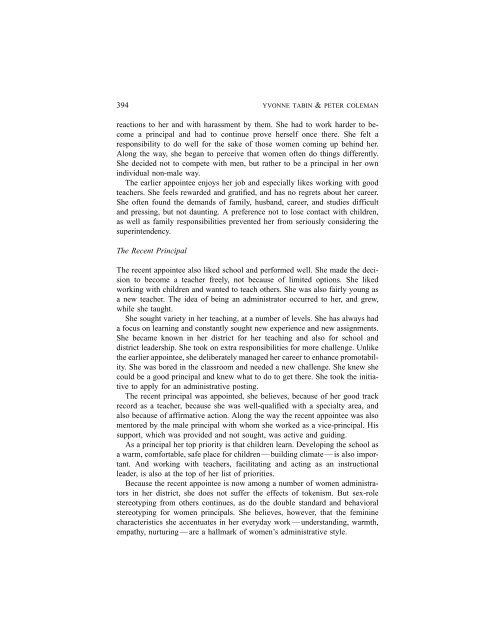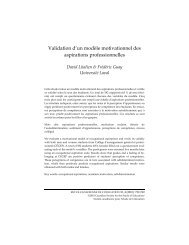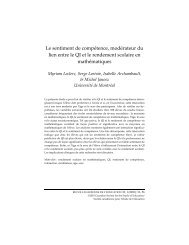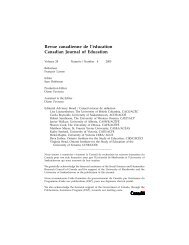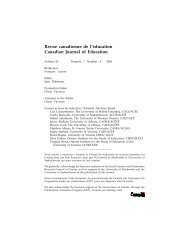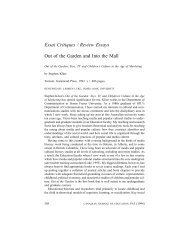Mireille Falardeau et Michel Loranger Le choix de stratégies ... - CSSE
Mireille Falardeau et Michel Loranger Le choix de stratégies ... - CSSE
Mireille Falardeau et Michel Loranger Le choix de stratégies ... - CSSE
Create successful ePaper yourself
Turn your PDF publications into a flip-book with our unique Google optimized e-Paper software.
394 YVONNE TABIN & PETER COLEMAN<br />
reactions to her and with harassment by them. She had to work har<strong>de</strong>r to become<br />
a principal and had to continue prove herself once there. She felt a<br />
responsibility to do well for the sake of those women coming up behind her.<br />
Along the way, she began to perceive that women often do things differently.<br />
She <strong>de</strong>ci<strong>de</strong>d not to comp<strong>et</strong>e with men, but rather to be a principal in her own<br />
individual non-male way.<br />
The earlier appointee enjoys her job and especially likes working with good<br />
teachers. She feels rewar<strong>de</strong>d and gratified, and has no regr<strong>et</strong>s about her career.<br />
She often found the <strong>de</strong>mands of family, husband, career, and studies difficult<br />
and pressing, but not daunting. A preference not to lose contact with children,<br />
as well as family responsibilities prevented her from seriously consi<strong>de</strong>ring the<br />
superinten<strong>de</strong>ncy.<br />
The Recent Principal<br />
The recent appointee also liked school and performed well. She ma<strong>de</strong> the <strong>de</strong>cision<br />
to become a teacher freely, not because of limited options. She liked<br />
working with children and wanted to teach others. She was also fairly young as<br />
a new teacher. The i<strong>de</strong>a of being an administrator occurred to her, and grew,<br />
while she taught.<br />
She sought vari<strong>et</strong>y in her teaching, at a number of levels. She has always had<br />
a focus on learning and constantly sought new experience and new assignments.<br />
She became known in her district for her teaching and also for school and<br />
district lea<strong>de</strong>rship. She took on extra responsibilities for more challenge. Unlike<br />
the earlier appointee, she <strong>de</strong>liberately managed her career to enhance promotability.<br />
She was bored in the classroom and nee<strong>de</strong>d a new challenge. She knew she<br />
could be a good principal and knew what to do to g<strong>et</strong> there. She took the initiative<br />
to apply for an administrative posting.<br />
The recent principal was appointed, she believes, because of her good track<br />
record as a teacher, because she was well-qualified with a specialty area, and<br />
also because of affirmative action. Along the way the recent appointee was also<br />
mentored by the male principal with whom she worked as a vice-principal. His<br />
support, which was provi<strong>de</strong>d and not sought, was active and guiding.<br />
As a principal her top priority is that children learn. Developing the school as<br />
a warm, comfortable, safe place for children — building climate — is also important.<br />
And working with teachers, facilitating and acting as an instructional<br />
lea<strong>de</strong>r, is also at the top of her list of priorities.<br />
Because the recent appointee is now among a number of women administrators<br />
in her district, she does not suffer the effects of tokenism. But sex-role<br />
stereotyping from others continues, as do the double standard and behavioral<br />
stereotyping for women principals. She believes, however, that the feminine<br />
characteristics she accentuates in her everyday work — un<strong>de</strong>rstanding, warmth,<br />
empathy, nurturing — are a hallmark of women’s administrative style.


